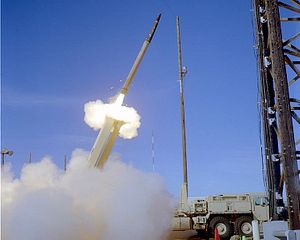In mid-November, South Korean conglomerate Lotte and the country’s Ministry of National Defense reached a deal to emplace an incoming missile defense battery on one of the firm’s golf courses. After months of protests, the positioning of the first U.S. Forces Korea Terminal High Altitude Area Defense (THAAD) system had been resolved: The battery would reside on one of Lotte’s golf courses in Seongju, in South Korea’s North Gyeongsang Province.
Now, it appears, that the company may be facing economic retribution of sorts from China, which has strongly and vocally opposed the deployment of THAAD on the Korean peninsula, fearing that the advanced X-band radars accompanying the missile defense platform could reveal sensitive information about its missile platforms to the United States.
The Financial Times catalogs that Chinese “Authorities have in the past week launched co-ordinated regulatory investigations into Lotte operations in Shanghai, Beijing, Shenyang and Chengdu.” The company confirmed that its operations in China had faced fire, safety or tax investigations from the Chinese government.”
“We don’t know the reason or the purpose of this investigation, so it is not appropriate for us to comment on it,” it added.
Scrutiny for Lotte wouldn’t be the first act of indirect and economic retaliation against South Korea over THAAD. When the deal to deploy the system was finalized this week, South Korean entertainers, including pop stars and actors, saw events and television appearances cancelled in South Korea. Jenna Gibson cataloged other instances of China-South Korea economic activity that was scuttled in the aftermath of the THAAD deployment.
What’s interesting is that most of the more visible Chinese retaliatory measures toward THAAD had come in August and September — shortly after the July finalization of the agreement. The investigation into Lotte coincides with an important milestone in South Korea’s ongoing political scandal, which culminated in a successful vote to impeach President Park Geun-hye on Saturday.
With Park out of office and Prime Minister Hwang Kyo-ahn temporarily in charge, the country’s political parties will be gearing up for new elections sooner than December 2016. (Pending the decision of the constitutional court on Park’s impeachment, new elections will need to be held in 60 days — potentially as early as next summer.)
Meanwhile, the early November timeline laid out by General Vincent K. Brooks, the commander of U.S. Forces Korea, sees the final deployment of THAAD coming next fall. The political scandal and its fallout leave the possibility of South Korea’s opposition coming to power. The opposition rejects the necessity of THAAD and could conceivably scuttle deployment.
Renewed Chinese economic pressure on Lotte — if linked to China’s opposition to THAAD — could once again bring the missile defense system to the top of political agenda in South Korea. For now, THAAD’s future in South Korea may be somewhat under question.

































